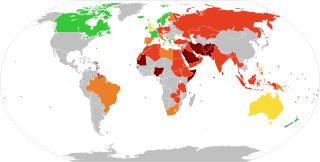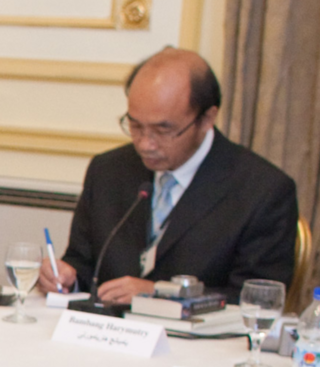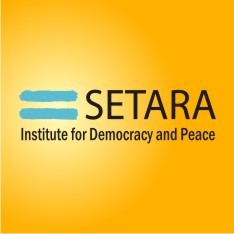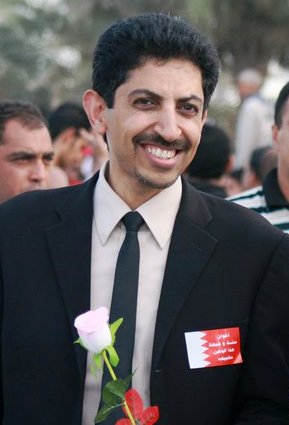Related Research Articles

Christian Solidarity Worldwide (CSW) is a human rights organisation which specialises in religious freedom and works on behalf of those persecuted for their Christian beliefs, persecuted for other religious belief or persecuted for lack of belief. Its current president is Jonathan Aitken, who succeeded Baroness Cox in 2006.
Human rights in Indonesia are defined by the 1945 Constitution and the laws under it; several rights are guaranteed especially as a result of the constitutional amendments following the Reform era. The Ministry of Law and Human Rights deals with human rights issues in the cabinet, and the National Commission on Human Rights, established in Suharto's New Order administration in 1993, is the country's national human rights institution.
Discrimination against atheists, sometimes called atheophobia, atheistophobia, or anti-atheism, both at present and historically, includes persecution of and discrimination against people who are identified as atheists. Discrimination against atheists may be manifested by negative attitudes, prejudice, hostility, hatred, fear, or intolerance towards atheists and atheism or even the complete denial of atheists existence. It is often expressed in distrust regardless of its manifestation. The main mechanism behind anti-atheist prejudice is the projection of believers' repressed desires. Perceived atheist prevalence seems to be correlated with reduction in prejudice.

Kareem Nabil Suleiman Amer is an Egyptian Norwegian blogger and former law student. He was arrested by Egyptian authorities for posts on his blog that were considered to be anti-religious and insulting to Egyptian President Hosni Mubarak. On 22 February 2007, in his native city Alexandria, Amer was sentenced to three years of imprisonment for insulting Islam and inciting sedition and one year for insulting the Egyptian President Hosni Mubarak. He was the first blogger in Egypt explicitly arrested for the content of his writing, and was released on 17 November 2010, but not before he was beaten and detained by Egyptian security forces. He thereafter moved to Bergen, Norway where he obtained political asylum and gained Norwegian citizenship.
The Indonesian constitution provides some degree of freedom of religion. The government generally respects religious freedom for the six officially recognized religions and/or folk religion. All religions have equal rights according to the Indonesian laws.

Johan Teterissa was a Moluccan elementary school teacher, activist and member of the Republic of the South Moluccas, or RMS, an active separatist group which advocates independence for the Maluku islands from Indonesia. Teterissa was sentenced to life in prison for treason in April 2008 after leading a nonviolent protest against Indonesian rule in 2007. Teterissa, and a group of 19 traditional Moluccan dancers, unfurled a secessionist flag of the banned South Moluccan Republic in front of Indonesian President Susilo Bambang Yudhoyono on June 29, 2007, in Ambon, the capital of Maluku. Amnesty International designated him a prisoner of conscience.
Jayaprakash Sittampalam Tissainayagam is a Sri Lankan journalist. He was detained by the Terrorism Investigation Division of the Sri Lanka Police on 7 March 2008. He was held without charge for almost 6 months. He was indicted on politically motivated charges under the draconian Prevention of Terrorism Act for intending to incite communal hatred through writing, and furthering terrorist acts through the collection of money for his publication. On 31 August 2009, he was convicted of the charges by the Colombo High Court and sentenced to 20 years of rigorous imprisonment.

A blasphemy law is a law prohibiting blasphemy, which is the act of insulting or showing contempt or lack of reverence to a deity, or sacred objects, or toward something considered sacred or inviolable. According to Pew Research Center, about a quarter of the world's countries and territories (26%) had anti-blasphemy laws or policies as of 2014.
Blasphemy law in Indonesia is the legislation, presidential decrees, and ministerial directives that prohibit blasphemy in Indonesia.

Azimzhan Askarov was a Kyrgyzstani political activist who founded the group Vozduh in 2002 to investigate police brutality. Of ethnic Uzbek descent, during the 2010 South Kyrgyzstan ethnic clashes, which primarily targeted people of the Uzbek nationality, Askarov worked to document the violence.
Ahmad Taufik ; was an Indonesian newspaper journalist known for his articles critical of the dictatorship of President Suharto.

Bambang Harymurti, commonly referred to by his initials BHM, is an Indonesian journalist and editor-in-chief of Tempo. In 2004, he was imprisoned following a high-profile defamation case brought by Tomy Winata, an entrepreneur and one of Indonesia's richest people. He is currently serving as deputy chair of Indonesia's Press Council.
The United Arab Emirates Five are five activists who were arrested in April 2011 on charges of breaking United Arab Emirates law of defamation by insulting heads of state, namely UAE president Khalifa bin Zayed Al Nahyan, vice president Mohammed bin Rashid Al Maktoum, and Abu Dhabi crown prince Mohammed bin Zayed Al Nahyan through running an anti-government website that express anti-government views.
Fadhila Mubarak is a Bahraini democracy activist. On 18 May 2011, she became the first female activist to be convicted for a role in the Bahraini uprising, and was named a prisoner of conscience by Amnesty International.
Ghazi Beji and Jabeur Mejri are Tunisian citizens sentenced on 28 March 2012 to 7.5 years' imprisonment for "transgressing morality, defamation and disrupting public order" after posting naked caricatures of Muhammad to Facebook. Mejri faced trial in court, while his friend Beji was convicted in absentia, having fled to Europe to escape prosecution. Mejri's appeal of his sentence was denied on 25 June 2012. Mejri's lawyer objected to his client being denied medical evaluation, describing him as "mentally unstable" and unemployed for the past six years.

SETARA Institute for Democracy and Peace is an Indonesia-based (NGO) that conducts research and advocacy on democracy, political freedom and human rights. SETARA Institute is a young research organization with core research focused on answering the actual needs of society. Its establishment in 2005 was intended as a response to fundamentalism, discrimination and violence on behalf of religion and morality in many fields that threaten pluralism and human rights in Indonesia. SETARA Institute works in secular space and does not carry out research penetrating into religious theologies. SETARA Institute is a pioneering defender of freedom of religious belief in Indonesia. It promotes civil freedom and policy change to push for pluralism and human rights.

The Bahrain Thirteen are thirteen Bahraini opposition leaders, rights activists, bloggers and Shia clerics arrested between 17 March and 9 April 2011 in connection with their role in the national uprising. In June 2011, they were tried by a special military court, the National Safety Court, and convicted of "setting up terror groups to topple the royal regime and change the constitution"; they received sentences ranging from two years to life in prison. A military appeal court upheld the sentences in September. The trial was "one of the most prominent" before the National Safety Court. A retrial in a civilian court was held in April 2012 but the accused were not released from prison. The sentences were upheld again on 4 September 2012. On 7 January 2013, the defendants lost their last chance of appeal when the Court of Cassation, Bahrain's top court upheld the sentences.
Yusak Pakage is an Indonesian activist for Papuan independence, best known for his 2005–2010 imprisonment for raising the pro-independence Morning Star flag.

Alber Saber Ayad is an Egyptian computer science student and blogger who was arrested on 13 September 2012 on allegations of having shared the YouTube trailer for the anti-Islam film Innocence of Muslims on his Facebook page. While he was raised in a Coptic Christian family, he is now an atheist.
Atheism, or irreligion in Indonesia, is uncommon among the country's inhabitants, as there is a great stigma attached to being an atheist in Indonesia and it is widely condemned by the Indonesian people.
References
- 1 2 3 4 5 6 7 8 "Indonesia: Atheist imprisonment a setback for freedom of expression". Amnesty International. 14 June 2012. Retrieved 25 June 2012.
- 1 2 3 Kate Hodal (3 May 2012). "Indonesia's atheists face battle for religious freedom". The Guardian. Retrieved 25 June 2012.
- 1 2 Syofiardi Bachyul Jb (14 June 2012). "'Minang atheist' sentenced to 2.5 years in prison". The Jakarta Post. Archived from the original on 16 June 2012. Retrieved 25 June 2012.
- 1 2 William Pesek (20 June 2012). "From Lady Gaga to Atheist Alexander to DBS, Indonesia Is Sending Investors Bad Signals". Jakarta Globe. Archived from the original on 23 June 2012. Retrieved 25 June 2012.
- ↑ "Amnesty Calls for Release of Jailed Indonesian Atheist". Jakarta Globe. 14 June 2012. Archived from the original on 18 June 2012. Retrieved 25 June 2012.
- 1 2 Ian McKinnon (20 January 2012). "Atheist Indonesian in protective custody after being beaten by mob". The Telegraph. Retrieved 25 June 2012.
- 1 2 Jimmy Hitipeuw (2 February 2012). "Indonesian Atheist's Arrest Sparks Tension Online". Kompas. Retrieved 27 June 2012.
- ↑ "Row over Indonesia atheist Facebook post". BBC News. 20 January 2012. Retrieved 25 June 2012.
- ↑ "Indonesian charged with blasphemy for atheist post". The Houston Chronicle. Associated Press. 21 January 2012. Retrieved 25 June 2012.
- 1 2 "Indonesian jailed for Prophet Mohammed cartoons". The Straits Times. Agence France-Presse. 14 June 2012. Archived from the original on 17 June 2012. Retrieved 25 June 2012.
- ↑ "Atheist Alexander Aan gets of prison". thejakartapost. 31 January 2014. Retrieved 31 January 2014.
- ↑ Febriamy Hutapea (13 June 2012). "Activists Call for Acquittal of Embattled Atheist Alexander". Jakarta Globe. Archived from the original on 16 June 2012. Retrieved 25 June 2012.
- ↑ Meghan Neal (15 June 2012). "Man jailed in Indonesia for atheist Facebook posts". Daily News. New York. Retrieved 25 June 2012.
- 1 2 Michael Gryboski (20 June 2012). "Atheist Group Launches Efforts to Help Jailed Facebook User in Indonesia". The Christian Post. Retrieved 25 June 2012.
- ↑ "URGENT: Add Your Voice to Support Jailed Atheist in Indonesia". Center for Inquiry. 25 April 2012.
- ↑ "Protest in Support of Jailed Indonesian Atheist Alexander Aan". Center for Inquiry. 2012. Retrieved 28 June 2012.
- ↑ "IMPORTANT: Protest in Support of Jailed Indonesian Atheist Alexander Aan" . Retrieved 28 June 2012.
- ↑ "Center for Inquiry Calls for Alexander Aan's Freedom in Letter to Indonesian Ambassador". Center for Inquiry. 21 June 2012. Retrieved 28 June 2012.
- ↑ "Indonesian atheist's arrest sparks tension online". Al Arabiya. 2 February 2012. Retrieved 25 June 2012.